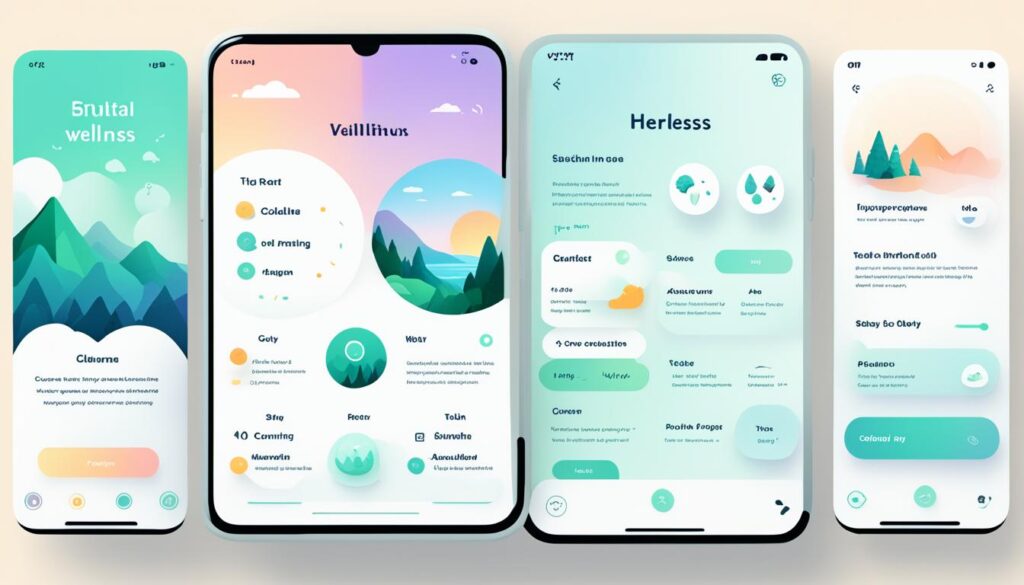Did you know over 70% of adults in the U.S. deal with daily stress or anxiety? Many lack easy access to customized mental wellness tools. The MYND app is changing this, using advanced AI to innovate mental health approaches.
MYND has introduced early access to an “AI Bestie.” This technology is all about offering real-time support that seems human. It adjusts to how you feel and uses facts to provide the right help exactly when you need it. It tailors meditations for work stress and mindfulness exercises for daily worries, just for you.
Thanks to backers like Microsoft, NVIDIA, AWS, and Google, MYND is working to remove the barriers around mental wellness. It’s also planning big features like speaking different languages and syncing with wearables to give instant advice.
MYND isn’t just about you. It’s creating a place where people help each other, using advanced AI for better meditation and mindfulness. This community and tech combo could truly change how we care for our mental health.
AI Therapists for Personalized Mental Health Support
Lately, there has been a big move towards using AI for mental health help. Examples include Woebot and Tess, chatbots that provide emotional exercises and support. They mark a big step towards custom mental health care.
Woebot and Tess: AI Chatbots Offering Therapy Exercises
Woebot and Tess have changed how CBT is given. Woebot uses smart emotional AI to interact with you. Tess offers unique mental health exercises and advice, like managing sleep and stress. They use language processing and learning tech to give tailored emotional support.
Wearable Technology for Mental Health Monitoring
Wearable tech is key for watching mental health. Tools like the Muse EEG and Apollo Neuro band help with mindfulness and stress. Sentio Solutions’ band tracks sweat and skin temp for a personal look at mental health. With AI therapy, this tech gives access to help 24/7.
Biobeat: A Wearable Device for Mood and Cognitive Assessment
Wearable tech has seen a big leap with Biobeat, a key player in measuring mood and cognitive skills. With its high-tech AI, Biobeat looks at body signals to check mental health thoroughly. This quick feedback helps in boosting mental health care by being preventive.

Biobeat’s main feature is its power to figure out things from heart rate changes. This info is key in spotting and even guessing mental health problems, serving both people and doctors well.
AI for Diagnosing and Predicting Mental Health Conditions
AI wellness schemes are shaping up the future of identifying and predicting mental health issues. They see how people feel to give doctors and you better views of mental health. This insight guides smarter health decisions.
Early Warning Signs and Personalized Treatment Plans
AI technology is changing how mental health experts recognize early signs and make treatment plans. It looks at patient behavior to catch problems early. This helps healthcare workers start treating issues before they get worse.

Improving Patient Compliance with AI Technology
AI’s ability to learn constantly is changing the game in getting patients to follow their treatment plans. It updates plans with the latest information, keeping them helpful. This means each person gets a treatment plan that fits them, making them more likely to stick with it.
Also, mental health platforms guided by AI can give feedback and tips right away. This cuts down on not following the treatment plan. It helps manage symptoms well and makes patients feel like they have a say in their journey to good mental health.
Predicting and Addressing Non-Compliance Patterns
AI tech is changing how we spot and deal with mental health non-compliance. It uses data about how people interact to see compliance issues coming. With this early insight, specific plans can be made. These plans make treatments work better ahead of time.
Personalized Strategies for Improved Compliance
AI offers personalized strategies to improve how well patients follow their treatment. These strategies are tailored to what the patient likes and does. For example, using ai-driven meditation and mindfulness daily can make patients follow their treatment better.
Personalized Treatments with AI in Mental Health
AI is changing how we see personalized treatments in mental health. It looks at user data and creates tailored support that changes with the person. This makes treatments more user-friendly and enjoyable. And as AI gets better, it could make patient support powered by AI even more exciting in the future.
AI Monitoring for Tailored Interventions
AI in patient progress has changed mental health care for the better. It allows for real-time adjustments to improve treatment outcomes. These systems work by analyzing data. Then they offer interventions that fit the user’s needs and their body’s signals. This approach keeps treatment effective and right for each person.
Real-Time Adjustments for Optimal Outcomes
AI’s quick changes are a big plus in mental health care. For example, it can adjust therapy based on a user’s mood or health. This makes the treatment feel personal and engaging. Such a dynamic method means constantly making a therapy to meet the user’s changing needs. The result is better mental health care outcomes over time.
Challenges in Using AI for Mental Health Treatment
Though AI has many pluses, it’s not all smooth sailing. There are concerns over data privacy and keeping the care consistent. Also, we must ensure that the technology is always reliable. Overcoming these hurdles is key to making the most of AI in mental health. We need strong plans to protect data and keep faith in AI solutions. Also, improving AI tech is crucial. It will make sure mental health care is trustworthy and offers more over time.
AI Bias and Unreliable Predictions
AI plays a bigger role in helping with mental health. But, it comes with worries about bias and wrong predictions. One big problem is catching all human emotions right. AI systems learn from data that might not show everyone’s feelings fully. This could carry over the creators’ cultural biases. It might not show emotional expressions right, especially for different groups.
Diagnosis Uncertainty and Subjective Judgment
Using AI for mental health checkups faces a tough spot with diagnosis uncertainty. AI is good at spotting trends but might miss the fine points in how we feel emotionally. This gap in understanding can mess up the accuracy of AI-based therapies. It could mean wrong diagnoses and even hurt the users by mistake.
Transparency and Methodological Flaws
Being clear about how emotional AI systems work is key for trust. They need to fix any issues coming from limited data sets. Making things clearer can cut down on bias and wrong guesses. This leads to more fair mental health solutions. They would better understand the mix of feelings we all have.
